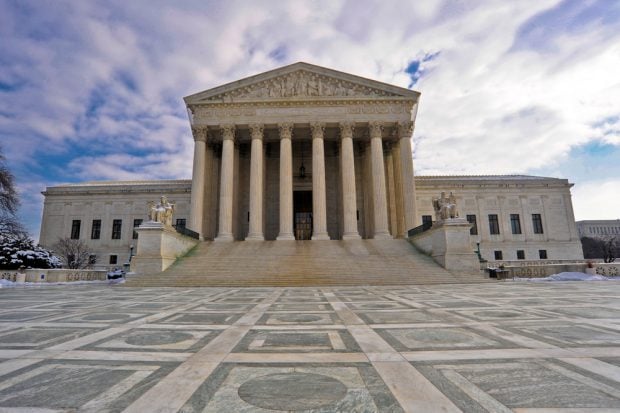Republican circuit court Judge Edith Jones on Monday“relentlessly peppered” the Department of Labor on what she viewedas trouble spots in its fiduciary rule's controversial bestinterest contract exemption during oral arguments in the casebrought by nine plaintiffs against the rule, according to Miller& Chevalier attorney Erin Sweeney.
|Jones, a Reagan appointee, was part of a three-judge panel thatheard oral arguments at the U.S. Court of Appeals for the FifthCircuit in the U.S. Chamber of Commerce's appeal, which resultedfrom an adverse lower decision issued by the U.S. District Courtfor the Northern District of Texas.
|Sweeney, who attended the arguments, said Jones probed Labor'sattorney, Michael Shih, with questions on how the BICE “could be'harmonized' with the statutory 'eligible investment advicearrangement' exemption, the basis for the DOL's authority overindividual retirement accounts, and whether the BICE impermissiblycreates a private right of action.”
|Gibson, Dunn & Crutcher partner Eugene Scalia, representingthe plaintiffs — which include the Chamber, the Securities Industryand Financial Markets Association and the Financial ServicesInstitute — again argued that the fiduciary rule is “overlybroad,” and that the rule and its exemptions should be vacated. Hestressed during the hour-long hearing that the rule institutes the“most sweeping changes to the retail financial services sectorsince the 1940 enactment of the Investment Advisers Act.”
|Practices in the marketing of IRAs, Scalia said, “are beingradically transformed for both the insurance agents andbroker-dealers. This change is being made not by Congress, not bythe Securities and Exchange Commission, and not by the states,which regulate insurance. It's being done by an agency that lacksregulatory power over IRAs, broker-dealers and insurance agents.And it's being done in a manner that repeatedly defies judgmentsmade by Congress.”
|Kent Mason, a parter at Davis & Harman in Washington,relayed to ThinkAdvisor that based on conversations with acolleague who attended the hearing, the three-judge panel “raisedexcellent questions” regarding Labor's authority to expand thedefinition of a fiduciary to cover pure sales activity, to regulateIRAs, and to create a new cause of action.
|However, “the judges gave no indication of how they would rule,but DOL went far beyond its authority on all three points,” Mason,a fiduciary rule opponent, opined. “So I am hopeful that the courtwill take appropriate action here to stop this rule, which iscausing immense damage without any legal basis.”
|Given the “relatively few” comments made by the otherpanelists — Clinton appointee Chief Judge Carl Stewart andBush appointee Judge Edith Clement — Sweeney added that it's“difficult to predict the outcome of the hearing, which has beenscheduled for expedited treatment.” A decision is expected in thefall, Sweeney said.
|Regarding Jones' probing on BICE, she “asked both parties whythey did not address the relationship between the BIC and the EIAAexemptions in their briefs,” Sweeney said, and “appearedexasperated when Shih could not explain why, how and whether theEIAA exemption might provide some clarity regarding whetherinvestment product sales constitute investment advice.”
|The former chief judge indicated that the failure to address therelationship between the two exemptions “creates some tension,”Sweeney said.
|Chief Judge Stewart ordered the parties to address therelationship between the BIC and EIAA Exemptions in 10-page briefsdue in 10 days, according to Sweeney.
|On the IRA front, Judge Jones pressed Shih, “demanding to knowexactly how many regulations and prohibited transaction exemptionsthe DOL had promulgated and issued addressing IRAs,” according toSweeney.
|Judge Jones proffered that the EmployeeRetirement Income Security Act covers “employment plans and is notdirected at IRAs,” Sweeney continued. “She further offered that thefiduciary rule 'transforms the lenient treatment of IRAs into anarchitecture of regulation.'”
|Shih stated that the BIC exemption “did not create a privateright of action because a state law cause of action always existedfor investment advice recipients to bring an action against adviceproviders,” Sweeney said. But Judge Jones disagreed, noting that“'only if you had a contract saying [the investment advisor] is afiduciary.'”
|Along those lines, “Judge Jones asked Shih whether disclosurewould be sufficient instead of requiring execution of a contractunder the BIC exemption, a concept that the DOL recently raised inits request for information” on the fiduciary rule, Sweeneyexplained.
|Clement probed Scalia on “the bottom line” regarding thefiduciary rule, asking: “Along with Judge Jones, I'm sort ofbefuddled about why this whole hornet's nest was created. What'sthe bottom line? What does the Department of Labor want to do withthis revision” under ERISA?
|Scalia responded: “Right now, salespeople of annuities andbroker-dealers are subject to a suitability standard for annuities[with the] suitability standard for annuities that is somewhatcomparable to suitability for broker-dealers. The Labor Departmentthinks that's not enough. The Labor Department is used toregulating with fiduciary duties and thinks everybody should havefiduciary duties.”
|Labor is currently seeking feedback on its fiduciary rule. UntilJuly 21, Labor took comments on whether to extend the Jan. 1applicability date of certain provisions in the BICE; the ClassExemption for Principal Transactions in Certain Assets BetweenInvestment Advice Fiduciaries and Employee Benefit Plans and IRAs;and Prohibited Transaction Exemption 84-24, which deals withannuities.
|Comments in response to the other 18 questions in the RFI aredue Aug. 7.
Complete your profile to continue reading and get FREE access to CUTimes.com, part of your ALM digital membership.
Your access to unlimited CUTimes.com content isn’t changing.
Once you are an ALM digital member, you’ll receive:
- Critical CUTimes.com information including comprehensive product and service provider listings via the Marketplace Directory, CU Careers, resources from industry leaders, webcasts, and breaking news, analysis and more with our informative Newsletters.
- Exclusive discounts on ALM and CU Times events.
- Access to other award-winning ALM websites including Law.com and GlobeSt.com.
Already have an account? Sign In
© 2024 ALM Global, LLC, All Rights Reserved. Request academic re-use from www.copyright.com. All other uses, submit a request to [email protected]. For more information visit Asset & Logo Licensing.









